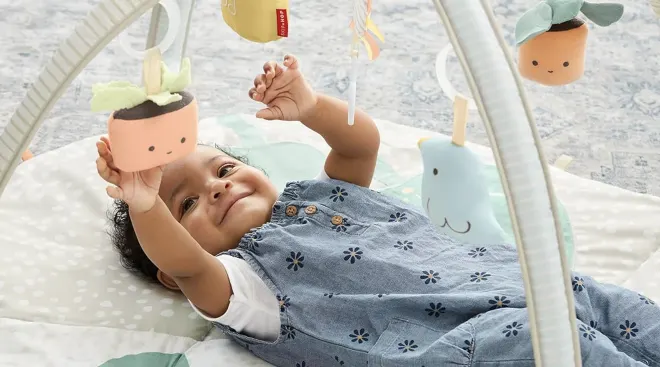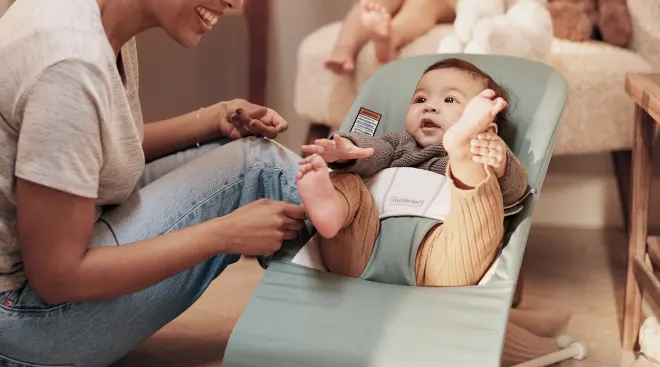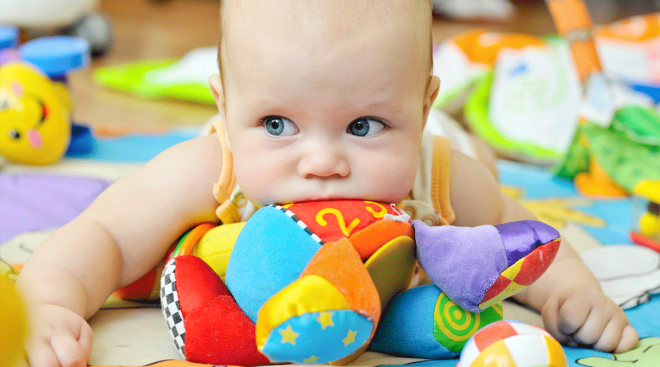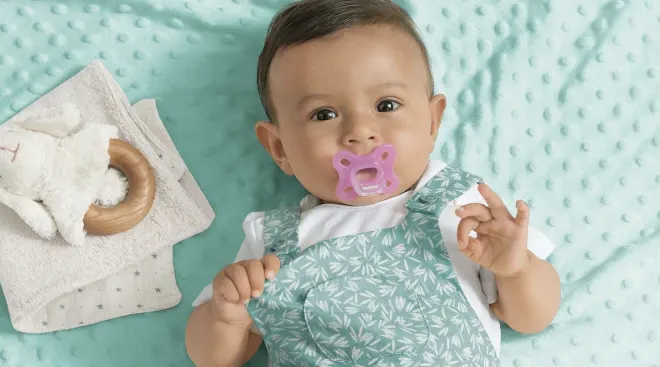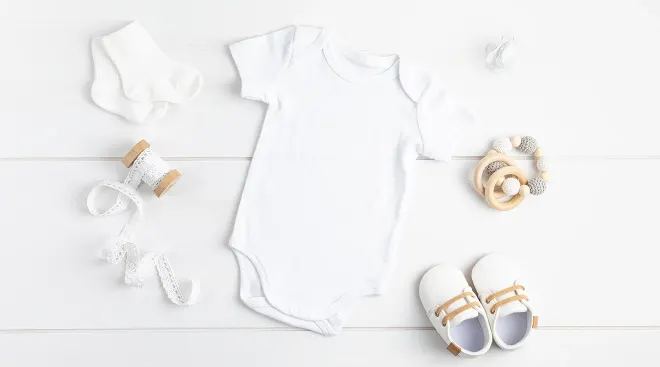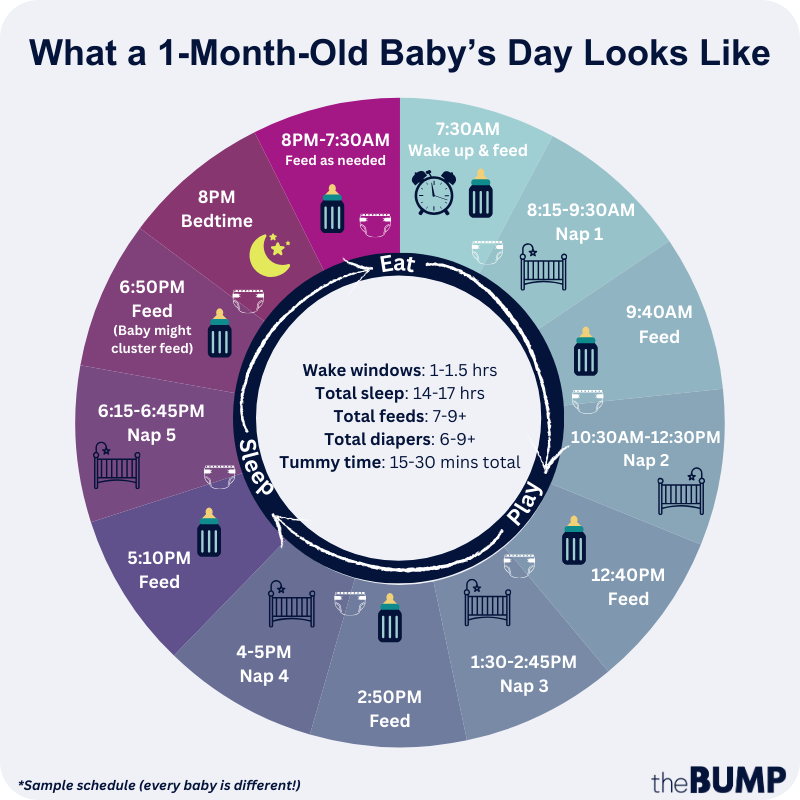1-Month-Old Baby

Baby is one month old! It's hard to believe how much your day-to-day has changed now that this beautiful (and confusing!) little person has entered the world and turned your life upside down. One-month-old babies are completely dependent on their caregivers. And chances are, you're completely in love with your newbie. You’re hopefully feeling more confident in your parenting abilities than you were just a month ago, and with good reason—you're trusting your instincts, putting baby first and reading up on 1-month-old baby development and parenting advice, which is proof enough that you're doing a great job!
Want to know what to expect in the coming days and weeks for your 1-month-old? We’re sharing everything you need to know to ensure baby is well on track—from 1-month-old baby milestones to sleeping and feeding schedules to basic routines and more.
- At 1 month old, baby is working on key motor skills and milestones, like holding their head up. It’s never too early to start tummy time to help develop baby’s muscles.
- Baby’s also finetuning their communication skills. They’ll be smiling and cooing soon!
- Pay attention to your postpartum mental health and self-care. If you have intense feelings of sadness that feel like more than the “baby blues,” reach out to your provider right away.
Baby’s still tiny—but not as tiny as they were just a few short weeks ago. They’ve likely gained 1.5 to 2 pounds and grown about 1.5 to 2 inches since birth, and baby’s head probably measures about an inch larger.
We know you’re wondering: How much should a 1-month-old weigh? What should their length (aka height) be? The average 1-month-old baby weight ranges from 5 to 10 pounds for girls and 6 to 12 pounds for boys, according to the World Health Organization.
Of course, if baby weighs or measures much more or much less than the average, it doesn’t mean there’s a problem. Babies—just like adults—come in different shapes and sizes. What’s important is that baby’s growing and putting on weight at a healthy rate. Your pediatrician will check on that, and ensure that they’re progressing on their growth chart at that all-important one-month checkup.
Heads up: A growth spurt is pretty common once baby hits 6 weeks old, so be mentally prepared! Sometimes babies feed more frequently when they’re growing fast, so know you might have to keep up with baby’s demands. (Cluster feeding, anyone?) Wondering if baby has hit this stage yet? If they’re acting fussier than usual or falling out of their sleep routine (if you even have one at this point!), it’s very likely your little one is working hard on growing bigger and stronger (a comforting reminder when you’re calming your cranky cutie at all hours of the night).
Your 1-month-old is still pretty much a cute blob at this point. But throughout the month you’ll notice some rapid changes and impressive developments. There are quite a few 1-month-old milestones on the horizon:
- You’ll start to notice refined motor skills. While baby’s movements will be jerky at first, over the next two months they’ll start to look more controlled, with their neck getting stronger. By the time they’re 2 months old, baby should be able to hold their head up on their own.
- At 1 month old, baby’s hearing is fully developed and they may turn their head toward familiar sounds.
- How far can a 1-month-old see? Baby’s vision is getting sharper, and they’re able to focus on objects that are about 8 to 12 inches away—so right now, baby may mostly stare at your face with wonder. Over time, they’ll be able to focus on objects that are further away.
- Baby’s sense of smell is developing too. They like sweet smells (bitter or acidic things are basically yuck to them), and if you’re nursing, baby would probably be able to pick your breast milk out of a lineup, since they know the smell and taste so well. (And, FYI, breast milk is also very sweet!)
- At around 2 months old, baby might start to smile when you smile at them!
- In the coming weeks, baby may start cooing or repeating vowel sounds when you play together—what could be more adorable? Pretty soon, this will lead to plenty of other sounds!
When to reach out to your pediatrician
While you should be patient with baby’s progress hitting milestones, there are a few developmental red flags you should be aware of. Call the doctor if your 1-month-old baby:
- Is feeding slowly, has trouble sucking, sweats while feeding, turns blue while feeding or projectile-vomits with most feedings
- Doesn’t blink in bright light
- Doesn’t respond to loud sounds
- Doesn’t focus their eyes on an object or follow it with their eyes when it moves
- Has a trembling jaw or repetitive movements that don’t stop when touched
- Doesn’t seem to move their arms and legs much
- Seems overly loose or overly stiff in the limbs
1-month-old reflexes
Your pediatrician will check baby for certain reflexes, aka involuntary movements or actions. At the 1-month-old stage, these include:
- Rooting reflex. If you stroke or touch the corner of baby’s mouth, they'll turn their head and open their mouth. This can help them find the breast or bottle to start feeding. This reflex will last until baby’s about 4 months old. Rooting helps prepare baby for sucking.
- Sucking reflex. Baby will start to suck when you touch the roof of their mouth.
- Moro reflex. The Moro reflex typically happens when baby is startled, like by a loud sound or movement. You’ll see them throw back their head, extend their arms and legs, and then pull them back in and cry. It usually goes away by around 2 months of age.
- Palmar grasp reflex. Baby will grasp their hand around yours when you stroke their palm (aww!). This reflex usually lasts until baby’s about 5 to 6 months old.
“Find what works best for you and your family. There’s endless, sometimes contradictory, advice available on the internet, but parents shouldn't stress if they’re doing things a little differently. The most important thing is making sure baby is feeding frequently enough.” — Ansley Schulte, MD, pediatric medical director at KidsPeace in Orefield, Pennsylvania
With a brand-new baby, you likely have plenty of questions for your pediatrician. A few common health concerns of parents of 1-month-olds include:
Crying
It’s very normal for a 1-month-old to cry a lot, whether it’s because they’re hungry or overwhelmed. Responding to baby’s cries is important, but so’s your mental health: There’s nothing wrong with setting baby down in a safe place for a few minutes if you’ve tried everything else. Wondering whether baby’s just being fussy or if it’s colic? Colic typically involves crying that lasts for three or more hours a day on three or more days a week, often around the same time. It’s a good idea to check in with your pediatrician if you’re at all worried. A little bit of relief: Colic normally resolves by the time baby is 3 to 4 months old.
Umbilical hernia
If baby has a bump under the skin by the belly button, don’t panic: It’s likely an umbilical hernia, which affects about 20 percent of babies. After the umbilical cord falls off, the muscle around the belly button typically closes up—if it doesn’t, you might see part of baby’s intestine bulging out. It can look bigger when baby cries or strains to poop. For the most part, umbilical hernias close up on their own by ages 4 or 5—but call your doctor if baby’s hernia is swollen or hard, if the skin over it is red or darker than usual, or if baby seems in pain.
Peeling skin on baby
It’s perfectly normal for baby’s skin to go through a peeling phase during the first couple of weeks of life. After all, their skin is adjusting from the uterus—where they were floating in amniotic fluid—to the harshness of the outside world. You’ll usually see peeling on the arms and legs, but it can also happen on the belly, back or butt. Peeling should stop on its own within a couple of weeks and doesn’t need any special treatment. Make sure to avoid the temptation to peel it any more, keep it moisturized and avoid using chemicals and fragrances on baby. Call your provider if baby’s skin looks red, bloody or irritated, or if it peels for longer than three weeks.
Baby hiccups
Hiccups in babies are normal—and generally pretty mild. They can happen when baby eats too fast or too much, and they might involve some acid reflux too. Burping baby is the best way to get rid of hiccups. Basically, you want to give baby a minute to digest. To prevent baby hiccups in the first place, if you’re bottle-feeding, it’s a good idea to make sure there’s no air in the nipple. If breastfeeding, make sure baby’s latching well. Holding baby upright after a feeding, rather than laying them back down, helps too. If baby’s also fussy, arching their back after eating, spitting up a lot or having reflux, it’s a good idea to check in with your pediatrician.
Checkup and vaccines
The American Academy of Pediatrics (AAP) suggests that baby should have a checkup with their pediatrician at the one-month mark. At baby’s one-month well-visit, your pediatrician will check baby’s height, weight and head circumference, and let you know how they’re tracking on a growth chart. They’ll also answer any questions you may have about feeding, sleep and development. During this visit, your pediatrician will also likely recommend that baby get a second dose of the hepatitis B vaccine. This could also be a good time to vaccinate baby for RSV if you haven’t done so yet—check with your provider for specifics.
For a 1-month-old baby, feeding “on demand” is the name of the game. That means as long as baby’s gaining weight as expected and wetting and soiling diapers on a regular basis, you don’t need to feed baby on an exact schedule. In fact, cluster-feeding is very common and expected. Particularly if you’re breastfeeding, it’s normal for baby (however exhausting it might be for you!) to want to eat every 30 minutes to an hour—especially in the evenings.
How much should a 1-month-old eat?
- Breastfeeding: If you’re breastfeeding, you’re probably feeding every hour-and-a-half to three hours. Baby will likely nurse seven to nine times a day. Don’t worry too much about how much breast milk baby’s getting. Baby will let you know when they’re full by stopping, moving away from your breast or falling asleep. Soon, baby will become a more efficient feeder and will be able to get more milk in a shorter amount of time—so you may notice you spend a bit less time feeding in the coming months.
- Bottle-feeding: If you’re formula-feeding, you’re likely feeding once every three to four hours and baby’s taking in about 3 to 4 ounces per feeding. Remember that it’s not an exact science! By now, you’ve probably learned to follow baby’s cues to determine when they’re hungry—you may even be able to identify their own distinct “hungry cry.”
One-month-old babies need about 15.5 hours of sleep per 24-hour period, but anything between 14 and 17 hours is considered normal. How it’s split up throughout the day depends on the baby, but seven hours of daytime sleep is pretty typical, with eight to nine hours of sleep coming at night. Night waking is typical at this age (sorry!) and there’s no such thing as a normal 1-month-old sleep schedule. A soothing bedtime ritual and giving baby plenty of attention during the day should help—as will gently establishing a routine.
It’s not really possible to get a 1-month-old on a schedule, but you can start to incorporate patterns throughout baby’s day. For example, an “eat, play, sleep” routine works for a lot of babies. Over time, you’ll find that sticking to a pattern like that may develop into a more predictable daily routine. Just remember to be flexible—things can change, and it’s important you roll with the punches. Keep following baby’s cues for hunger and sleep.
Since baby has super-short wake windows at this age—around 45 to 60 minutes—they’re going to be taking quite a few naps and spend most of their day sleeping. While there’s room for a lot of flexibility in a 1-month-old’s day-to-day, here’s an example of what their routine might look like:
Sure, a 1-month-old baby can’t do too much yet (yep, we’ll say it again, they’re just a cute blob!), but they’ll still get a kick and tons of benefits out of playtime with you. Don’t know where to start? Below, some ideas to try with your tiny playmate.
- Talk to baby. It’s never too early to start communicating with your little one. Use an animated voice, make eye contact and pour your heart out. Don’t know what to talk about? Walk your 1-month-old through a diaper change, describe different family members or chat about the animal characters on their nursery walls. Baby loves your familiar voice and is happy to listen to anything and everything you want to say—or sing for that matter. And when they start to coo? Reply right back! These early conversations are precious, and baby will adore every moment.
- Read to baby. Grab a picture or board book, and introduce your 1-month-old to the joys of reading. Research has found that reading to baby from the get-go can foster early literacy skills. What’s more, it offers a sweet bonding moment.
- Make silly faces. Babies love to look at faces, so give them what they want! Scrunch up your nose, stick out your tongue or make a puckered face, and your 1-month-old baby will think it’s an absolute hoot. For now, you’ll be the star of this one-person show. Before you know it, they’ll join in and begin imitating your silly faces and even trying out their own.
- Use rattles and toys. At this stage, a 1-month-old baby may start using their eyes to track moving objects. To encourage this reaction, shake a brightly colored rattle or move a ball from side to side, and see if baby’s head turns. Baby may soon connect the dots and understand that their eyes can follow an object’s motion.
- Go for a walk. Fresh air can work wonders for you and your 1-month-old baby. Going for a stroll is also a great early way to expose baby to the outside world. Different sights, smells and sounds will help engage baby’s senses. What’s more, a change of scenery might do you some good too!
- Do tummy time. Aim for about a half an hour of tummy time a day to help build up muscles and keep baby active.
With a month of parenthood under your belt, you’re likely starting to figure out the balancing act of caring for yourself and baby. Keep these tips in mind as you continue to navigate this wild ride:
Postpartum recovery tips
There’s no one-size-fits-all approach to postpartum recovery, largely because everyone’s experience is so different. However, here are a few important topics you’ll want to know about:
- Postpartum bleeding. Lochia is post-birth vaginal discharge that consists of blood, mucus and uterine tissue. It can feel like a heavy period (sometimes with small clots) for the first few days, and then get lighter, and it usually lasts about six weeks. Wear a pad—you can also make a padsicle if you need extra relief!—and check in with your doctor if you’re experiencing excessive bleeding (soaking a pad every hour) or pelvic pain.
- Postpartum pain management. It’s common to experience cramping, achy joints, perineal pain, bowel problems, hemorrhoids and more during your postpartum journey. On top of that, you might have uterine cramping or “afterpains” But you don’t have to suffer! A heating pad, along with ibuprofen, can go a long way for pain and cramping, while medicated sprays and sitz baths can ease pain from hemorrhoids. Depending on your situation, you may need to see a physical therapist or pelvic floor therapist.
- C-section care. If you had a C-section, it can take up to six weeks to recover. To ease the pain, you should be able to take anti-inflammatories and pain medication, depending on your doctor’s specific recommendations. Move gently and avoid heavy lifting for six weeks. Make sure to watch for any signs of infection and follow your provider’s C-section recovery advice for caring for your incision. If pain worsens, make sure to reach out to your doctor.
- Breastfeeding challenges. Breastfeeding isn’t always a seamless experience. You may deal with problems like engorgement, nipple pain, low milk supply and even mastitis. Make sure to talk to a lactation consultant about getting a proper breastfeeding latch and any other issues you may be experiencing.
Postpartum mental health tips
Rest assured that if you’re experiencing mental health issues after baby’s birth—from depression to anxiety to OCD—you’re not alone. Make sure you speak with a mental health professional if you’re struggling, and keep the following tips in mind:
- Pinpoint whether it’s baby blues or postpartum depression. The “baby blues” are mood swings, which may include irritability and sadness, that can come and go in the first few days after having a baby and usually get better after a week or two. Postpartum depression is more serious and sticks around longer: You may experience intense feelings of sadness or despair that keep you from your daily activities. Reach out to your provider if you suspect you might be experiencing postpartum depression.
- Keep an eye on newfound anxiety. Anxiety is normal after having a baby: It’s scary to be responsible for a little one’s life! Give yourself some grace. But if you find that your worries are all-consuming, or you have physical anxiety symptoms like shortness of breath, muscle tension and dizziness, check in with your doctor.
- Find what self-care works for you. Taking care of a baby is a lot, and it’s a big adjustment. While you’re likely focused on baby, it’s still important to take time for yourself. Make sure to do something you enjoy each day that makes you remember who you are outside of parenting.
1-month-old baby care tips
It might feel overwhelming to have to remember all the things when it comes to caring for baby. Here are a few basics to get you started:
- Tracking wet diapers. Doctors usually recommend keeping tabs on how many wet diapers baby has in a day. A well-nourished baby should typically have six or more wet diapers a day, with nearly colorless or pale yellow pee.
- Swaddling. Swaddling can be a helpful tool to help baby calm down before bed. If you choose to swaddle, make sure to lay baby on their back to sleep (this goes whether you swaddle or not!), make sure the swaddle’s not too tight and don’t use weighted swaddle blankets or weighted objects inside the swaddle. Once baby shows signs of being able to roll over (typically around 3 to 4 months), stop swaddling.
- Caring for cradle cap. Cradle cap looks like a thick, yellowish, scaly rash on baby’s scalp. It usually starts between three weeks and two months after birth. You don’t need to do anything specific to treat cradle cap, but washing baby’s hair with a mild baby shampoo more frequently and loosening scales while shampooing may help. Resist any temptation to scratch or pick the scales.
- Using a sound machine. A sound machine—often called a white noise machine—can help soothe baby to sleep and block out excess noise. But it’s important to be mindful of the volume, and to keep the machine at least 7 feet away from baby’s crib.
Having a 1-month-old is a topsy-turvy experience. You’ll have some wins—and you’ll definitely face your share of challenges. It’s important to celebrate the small moments and know that you’re never truly alone on this roller coaster. Let these relatable stories from real parents inspire you on your own parenting journey.
- Win: “I couldn't stand being cooped up in this house for one more second, so I braved the grocery store for the first time with my daughter and it went great! I kept her car seat covered up with another blanket to protect her from germs (and the pouring rain). Win!” — kattyleigh
- Challenge: “This phase is so hard. It’s been so lonely because no one else can handle my baby and my baby only wants me. So I’m by myself all the time because nobody has time or energy to deal with what I’m doing right now, which is one-hour wake windows with a baby who sleeps for two hours then is up for one. And I have to be silent because the baby only sleeps on me.” — knottiedbacceb7847fbbcd
- Wisdom: “I just had my fifth baby, and trust me, each time there’s an adjustment period! If you're feeling very overwhelmed, make sure you talk to your doctor because postpartum anxiety or stress is just as real as depression. If you're feeling okay and just trying to navigate the waters in mommyhood, babywearing is a huge game-changer as far as getting things accomplished around the house. I even use it when I'm walking the kids to or from school or to take my 3-year old for a walk and keep my hands free. Also, find something safe to keep your baby in that you can put near the shower so you can easily take at least a quick 5-minute shower, even if they scream the whole time. Try to time it for when they’ve finished eating, been burped and have a clean diaper. You’ll feel better knowing you’ve taken care of baby as well as you can. It’s very normal at this age for baby to fuss and cry often. Rest and slowly learn to care for baby and yourself—this time will pass and things will get a little easier (each stage brings its own new difficulty). Enjoy your sweet, soft, snuggly baby!” — hlisle
“Within days of giving birth, I felt overwhelmed with anxiety and sadness. I felt irritable, unfocused and exhausted. I was aware of the baby blues, so I kept telling myself that things would get better. But weeks passed and I continued to feel awful. I remember at one point Googling, ‘How long does it take a woman to feel like herself again after having a baby?’ and Google told me that it could take up to 12 weeks. At that point, I was only a few weeks in and couldn't imagine feeling this way much longer. I wish I could pinpoint when it turned around, but the truth is that it was a gradual improvement over time.” — Emily Guarnotta, mom of two in Myrtle Beach, South Carolina
Frequently Asked Questions
What’s the best way to burp baby?
There are several ways to burp baby, and you’ll likely find that one strategy works best for you. You can try sitting upright, with baby against your chest and gently patting baby’s back. You can also hold baby sitting up in your lap or across your knee while cradling baby’s chin and patting their back. Laying baby on your lap on their belly while supporting their head and patting them on the back can also help.
How often should I bathe my 1-month-old?
Babies don’t usually get very dirty, so you don’t need to bathe your little one all that often. In fact, bathing them too often can dry out their delicate skin. Doctors generally recommend bathing baby as needed, with no more than two to three baths a week. You can also spot-clean baby with a wet washcloth.
When can I introduce a pacifier to baby?
If you’re breastfeeding, you might want to wait until nursing is established before offering baby a pacifier. That said, go ahead and try a binky out as soon as you feel comfortable! It can be beneficial in more ways than one: Offering a pacifier at naptime and bedtime can help reduce the risk of Sudden Infant Death Syndrome (SIDS). Of course, keep in mind that if baby depends on the pacifier to fall asleep, they may wake up when it falls out—and cry for it.
When to give a bottle to a breastfed baby?
When baby is about 4 weeks old, you may want to offer a bottle if breastfeeding is going well. You can use pumped breast milk or an ounce of formula to allow baby to get used to a bottle. Start with bottle-feeding once a day.
Is it too early to start tummy time?
Nope! You can actually start tummy time—which helps baby develop strong muscles—the day baby gets home from the hospital. Start with two to three times a day for three to five minutes at a time, and work up to 15 to 30 minutes daily by the time baby’s 7 weeks old. If baby doesn’t like tummy time, try placing a toy—or yourself—in front of them to give them something to reach for.
The early days of parenthood are equal parts exciting and exhausting. One-month-olds learn and grow every day. It’s a nonstop adventure; enjoy all the 1-month-old baby milestones. Trust us, the old adage is spot on: The days are long, but the years are short. Soak it in.
Please note: The Bump and the materials and information it contains are not intended to, and do not constitute, medical or other health advice or diagnosis and should not be used as such. You should always consult with a qualified physician or health professional about your specific circumstances.
Navigate forward to interact with the calendar and select a date. Press the question mark key to get the keyboard shortcuts for changing dates.

































